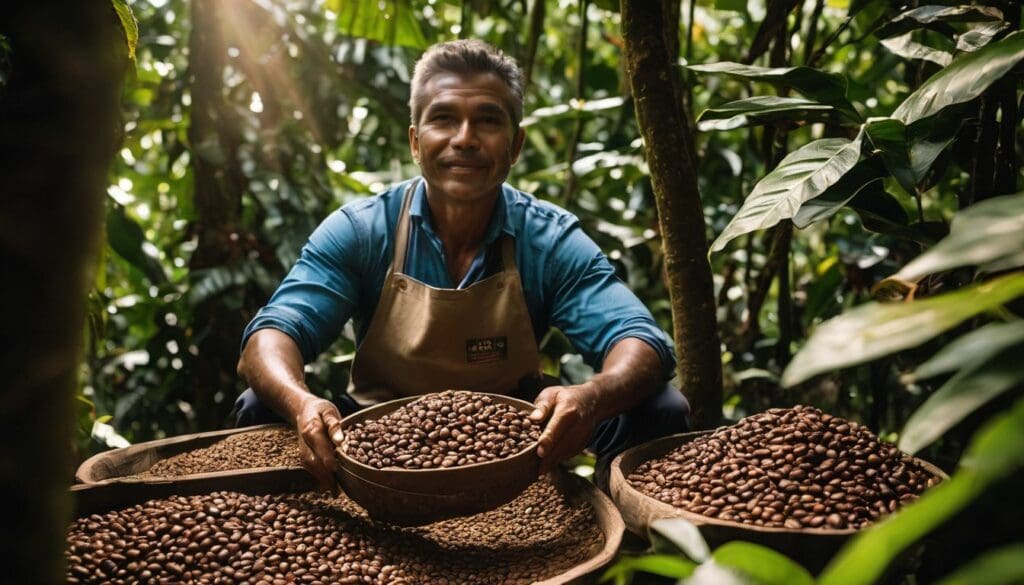Do you ever wonder where your favourite products come from and how they are made? As an environmentally conscious individual, I’ve also been concerned about the impact of consumer goods on communities and the environment. Through extensive research, I’ve discovered the importance of Fair Trade Certification in ensuring ethical production and sustainable sourcing. In this blog post, we’ll explore the impact of Fair Trade Certification on global communities, workers, and consumers, as well as highlight brands that are making a difference through fair trade practices. Join me as we delve into the world of fair trade and its significance for consumers like us.
Key Takeaways
- Choosing Fair Trade Certified products means you are supporting ethical and sustainable production, ensuring fair wages and safe conditions for workers.
- Buying from brands like Ben & Jerry’s, Nespresso, Endangered Species Chocolate, Starbucks, and Tony’s Chocolonely helps make a real difference in the lives of people in developing countries.
- Consumers have the power to influence industries by demanding more Fair Trade products, which can lead to wider adoption of ethical practices among companies.
- Through Fair Trade Certification initiatives communities receive support that leads to better education and healthcare access as well as poverty reduction.
- Being informed about the principles behind Fair Trade can help consumers actively seek out certified products to support positive environmental conservation efforts.
Definition of Fair Trade
Fair Trade means we’re choosing products that meet certain social, economic, and environmental standards. By picking these items, we ensure that the people who make them receive fair wages and work in safe conditions.
It’s about more than just paying a decent income; it’s a commitment to ethical production and sustainable sourcing.
We look for the Fair Trade certification because it tells us that brands are helping to transfer wealth back to farmers and workers in developing countries. This way, we support stronger communities while enjoying quality goods with confidence.
Every time we shop, our choices have power – opting for Fair Trade sends a message of social justice and corporate responsibility.
Impact of Fair Trade Certification
Fair Trade certification has a significant global impact, improving the lives of communities and workers by ensuring fair wages and better working conditions. It also promotes sustainable production and ethical trade practices in consumer goods.
Global impact
Our commitment to Fair Trade Certification goes beyond local benefits; it triggers a chain reaction with profound global impact. By choosing products that meet these standards, we’re part of the movement for wealth redistribution from developed countries to developing regions.
We ensure that workers across the globe receive fair compensation, leading to economic empowerment in their communities.
We also drive up social and environmental standards on an international scale. With every purchase, we vote for sustainable production practices and stand against exploitation and environmental harm.
This influences industries everywhere, pushing them towards more ethical trade methods that respect people and the planet alike.
Impact on communities and workers
Moving beyond the global impact, fair trade certification has a direct and profound effect on communities and workers in developing countries. This commitment ensures fair wages, safe working conditions, and empowers individuals to build sustainable livelihoods for themselves and their families.
By supporting fair trade certified products, consumers play an integral role in upholding worker rights, promoting economic standards, and fostering community development.
Fair trade also contributes to environmental stewardship by encouraging ethical sourcing practices that protect natural resources. It is about creating a positive cycle of support—consumers championing products that uphold fair labor practices which directly benefit communities and workers while also preserving the environment for future generations.
Impact stories
- A cocoa farmer in Ghana was able to send her children to school and access healthcare due to fair remuneration for her labour.
- An artisan in Nepal gained financial independence and improved living conditions through fair wages and a supportive working environment.
- Coffee farmers in Colombia formed a cooperative with Fair Trade support, enabling them to invest in sustainable farming practices and improve their community’s infrastructure.
Importance of Fair Trade Certification for Consumers
Consumers benefit from Fair Trade certification by gaining confidence in the ethical and sustainable production of products, supporting workers and communities, and making a positive impact on global economic standards.
To learn more about how Fair Trade certification plays a crucial role for consumers, keep reading!
Increased confidence and trust in products
Fair Trade certification enhances our confidence in the products we purchase, knowing that they have been ethically and sustainably produced. With Fair Trade standards in place, we can trust that workers have been paid fairly, environmental standards have been upheld, and communities supported.
This assurance allows us to make informed choices, supporting brands that align with ethical and sustainable practices.
Having confidence in Fair Trade Certified products is vital for ensuring that our purchasing decisions contribute to positive impact globally, particularly in developing countries.
Ethical and sustainable production
Choosing Fair Trade Certified products promotes ethical and sustainable production. By purchasing goods with this certification, consumers actively contribute to a supply chain that values fair wages, safe working conditions, and environmentally friendly practices.
This conscious decision supports developing countries’ economies while protecting workers’ rights and the environment. Fair Trade Certification ensures that the products are made ethically and sustainably, aligning with environmentally conscious individuals’ principles.
Support for developing countries is inherently tied to ethical and sustainable production through Fair Trade Certification in consumer goods. When we choose these certified items, we make a direct impact on communities worldwide by advocating for fair treatment of workers and responsible environmental stewardship.
Support for workers and communities
After understanding the impact of fair trade certification on ethical and sustainable production, it’s crucial to recognise its significant support for workers and communities. Fair trade practices ensure that workers receive fair wages and operate in safe working conditions.
By purchasing fair trade certified products, consumers actively contribute to improving the livelihoods of workers in developing countries while supporting their communities through social initiatives and infrastructure development.
Consumers who value fairness and sustainability play a vital role in empowering workers and supporting local communities by choosing fair trade certified goods. This conscious decision not only promotes economic stability but also encourages brands to continue their commitment to fair labour practices, ultimately contributing to positive global change.
Brands Making a Difference through Fair Trade
Ben & Jerry’s, Nespresso, Endangered Species Chocolate, Starbucks and Tony’s Chocolonely are just a few examples of brands that have made a commitment to Fair Trade, ensuring that their products are ethically and sustainably produced.
These brands serve as leaders in the industry and demonstrate the positive impact that fair trade certification can have on communities and workers around the world.
Ben & Jerry’s
Ben & Jerry’s has been a trailblazer in the food industry, demonstrating its commitment to fair trade principles. The company sources ingredients such as cocoa, vanilla, and sugar through fair trade channels, ensuring that farmers receive fair compensation for their produce.
By choosing Fairtrade-certified products, consumers are supporting sustainable farming practices and contributing to global social and economic change.
The impact of Ben & Jerry’s commitment to fair trade extends beyond the farmers; it also improves the welfare of communities in developing countries. Through their involvement with Fair Trade initiatives, Ben & Jerry’s encourages ethical and equitable working conditions while protecting workers’ rights.
Nespresso
Nespresso sources its coffee through the AAA Sustainable Quality Program, working with farmers to produce high-quality sustainable coffee. By investing in training and resources, Nespresso helps farmers improve their productivity while promoting ecologically friendly farming practices.
This not only supports environmental conservation but also provides economic stability for coffee-growing communities.
Nespresso’s commitment to fair trade principles ensures that every cup of coffee has a positive impact on the environment and the lives of those involved in producing it. Through initiatives like reviving local economies and protecting natural resources, Nespresso is making a significant contribution to sustainable development in the global coffee industry.
Endangered Species Chocolate
Endangered Species Chocolate sources its cocoa beans from Fair Trade Certified farms. By doing so, they ensure that the farmers and workers involved receive fair wages and work in safe conditions.
This approach supports developing communities while allowing consumers to enjoy delicious chocolate guilt-free, knowing that their purchase makes a difference for people and the planet.
The commitment of Endangered Species Chocolate to Fair Trade Certification aligns with the values of environmentally conscious individuals who support conservation and ethical consumerism.
Other brands making similar strides in promoting fair trade practices include Starbucks, Ben & Jerry’s, Nespresso, and Tony’s Chocolonely.
Starbucks
Transitioning from the impact of Fair Trade on Endangered Species Chocolate, Starbucks is another brand making a significant difference through its commitment to Fair Trade Certification.
By sourcing their coffee beans ethically, Starbucks supports small-scale farmers and promotes sustainable agricultural practices. This not only ensures fair compensation for workers but also contributes to environmental conservation in developing countries where coffee is grown.
Through their efforts, Starbucks provides consumers with the opportunity to support ethical and sustainable production while enjoying their favorite beverages.
Tony’s Chocolonely
Transitioning from discussing Starbucks’ commitment to Fair Trade, Tony’s Chocolonely also exemplifies the impact of ethical sourcing and fair trade certification. With a mission to eliminate child labour and modern slavery in the chocolate industry, Tony’s Chocolonely takes a proactive approach towards creating positive change.
By prioritising direct relationships with cocoa farmers and paying them a living wage, they are contributing to the empowerment of communities and improving working conditions.
Their dedication to fair trade principles not only ensures the production of high-quality chocolate but also resonates with environmentally conscious consumers who advocate for sustainable and ethical practices in consumer goods.
The Role of Fair Trade in Social and Economic Change
Fair Trade plays a crucial role in social and economic change by strengthening communities, protecting workers’ rights, and shaping industries for the better. It creates a more sustainable and ethical production process that benefits everyone involved.
Strengthening communities
Fair Trade Certification strengthens communities by ensuring that workers receive fair wages and work in safe conditions. This helps to uplift entire communities, providing access to education and healthcare, and reducing poverty.
By purchasing Fair Trade Certified products, we directly contribute to the prosperity of these communities. This empowerment enables locals to take charge of their futures and develop sustainable businesses.
Support for developing countries is vital in shaping a more equitable world. When consumers choose Fair Trade Certified goods, they are actively participating in community development on a global scale.
Protecting workers’ rights
Promoting fair trade not only strengthens communities but also protects workers’ rights. By ensuring that producers receive fair wages and work in safe conditions, fair trade certification helps to combat exploitative labor practices.
This ensures that the workers who produce consumer goods are treated ethically and have access to better opportunities for their livelihoods.
Fair trade certification plays a crucial role in supporting developing countries by advocating for the rights of workers throughout the supply chain. Consumers who support fair trade products can actively contribute to this cause while making conscious choices about their purchases, ultimately bringing positive change on a global scale.
Shaping industries for the better
Fair Trade Certification is reshaping industries for the better by promoting ethical and sustainable production practices. This certification holds companies accountable for fair wages, safe working conditions, and environmentally friendly processes.
It encourages businesses to prioritise the well-being of producers and workers, leading to positive changes in how consumer goods are manufactured.
By supporting Fair Trade Certified products, consumers play a pivotal role in influencing industries to embrace more responsible practices. As demand grows for ethically sourced goods, more companies will have an incentive to adopt Fair Trade standards, creating a ripple effect that can elevate entire sectors towards greater social and environmental responsibility.
How Consumers Can Support Fair Trade Workers
Consumers can support fair trade workers by choosing products with Fair Trade Certification, educating themselves on the importance of Fair Trade, and encouraging brands to become Fair Trade Certified.
Supporting fair trade workers helps to ensure ethical and sustainable production practices in consumer goods.
Choosing Fair Trade Certified products
When purchasing goods, we can actively support ethical and sustainable production by choosing Fair Trade Certified products. By opting for these items, we contribute to the improved well-being of workers and communities in developing countries.
This action allows us to make a tangible difference in global supply chains, ensuring fair wages and safe working conditions for those involved in the production process. Moreover, by selecting Fair Trade Certified products, we exhibit our commitment to supporting conservation and environmental sustainability while promoting social responsibility.
Supporting fair trade not only aligns with our values as environmentally conscious individuals but also empowers us to play a vital role in creating positive change within the consumer goods industry.
Educating oneself on Fair Trade
To support developing countries and protect workers’ rights, educating oneself on Fair Trade is crucial. By understanding the principles of Fair Trade certification, consumers can make informed choices when purchasing goods.
This involves learning about the criteria for Fair Trade certification, such as fair wages, safe working conditions, and sustainable practices. Additionally, staying informed about brands that support Fair Trade helps ensure that purchases contribute to positive social and economic change.
Moreover, consumer awareness plays a pivotal role in driving demand for Fair Trade products. Gaining knowledge about the impact of Fair Trade enables individuals to actively seek out items with this certification.
Encouraging brands to become Fair Trade Certified
Supporting Fair Trade can be taken a step further by encouraging brands to become Fair Trade Certified. By advocating for transparency and ethical practices, we have the power to influence companies to prioritise fair wages and working conditions for farmers and workers in developing countries.
When consumers demand Fair Trade products, it sends a message to businesses that there is a market for ethically sourced goods. We can use our purchasing power as a catalyst for positive change, motivating more companies to embrace Fair Trade principles and contribute to sustainable development in vulnerable communities.
Fair Trade Certification benefits not only producers and workers but also aligns with the values of environmentally conscious individuals supporting conservation efforts. It ensures that products are cultivated or produced in an eco-friendly manner, promoting sustainable agricultural practices.
Conclusion
In conclusion, Fair Trade Certification plays a crucial role in ensuring ethical and sustainable production practices. It empowers consumers to make informed choices and supports workers and communities globally.
By choosing Fair Trade Certified products, we can contribute to positive social and economic change while promoting fairness in consumer goods. Let’s continue to educate ourselves on Fair Trade and encourage more brands to become certified, ultimately making a difference in the world through our purchasing decisions.
FAQs
1. What does Fair Trade Certification mean for consumer goods?
Fair Trade Certification on consumer goods shows that they have been produced under fair working conditions and the producers receive a just compensation.
2. Why is Fair Trade important for consumers to look out for?
By choosing goods with Fair Trade Certification, consumers support ethical trading practices and help improve livelihoods of workers globally.
3. How does having a Fair Trade Certified product affect the quality?
Products that are Fair Trade Certified often meet rigorous standards which can lead to higher quality as producers invest more care into their creation.
4. Can buying products with Fair Trade certification make a real difference?
Yes, when you buy products with the certification, you play an active role in promoting fair wages and safe work environments, ultimately driving positive change in communities where these goods are made.





